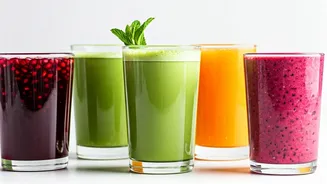The Artery Plaque Threat
Artery plaque, also known as atherosclerosis, is a serious condition where plaque builds up inside the arteries. This buildup narrows the arteries, restricting
blood flow and potentially leading to serious heart problems such as heart attacks and strokes. Many factors can contribute to plaque formation, including high cholesterol, high blood pressure, and unhealthy lifestyle choices. Understanding the risks and taking preventative measures is essential for maintaining heart health. Dietary adjustments, especially the inclusion of heart-healthy beverages, can play a significant role in mitigating these risks. It's crucial to adopt a proactive approach, incorporating foods and drinks that support the cardiovascular system and reduce the likelihood of plaque formation.
Green Tea's Power
Green tea is packed with antioxidants, particularly catechins, which are believed to help reduce LDL cholesterol levels, often referred to as 'bad' cholesterol. High LDL cholesterol is a significant contributor to artery plaque formation. Regular consumption of green tea may help protect the arteries from damage and reduce the risk of plaque buildup. Studies have indicated that drinking green tea can improve blood vessel function and lower blood pressure, further aiding cardiovascular health. Consider brewing a cup of green tea daily as part of your routine. Be aware of the amount of caffeine and moderate your intake if you're sensitive. Explore various green tea varieties to find a flavor you enjoy, and experiment with additions such as lemon or honey to enhance its taste.
Berry Blast for Vessels
Berries, including blueberries, strawberries, and raspberries, are rich in antioxidants called anthocyanins, which give them their vibrant colors. These compounds have potent anti-inflammatory properties and can protect against arterial damage, thereby reducing plaque formation. They also may improve the function of blood vessels and lower blood pressure. Adding berries to your diet is easy; enjoy them in smoothies, yogurt, or as a snack. They also pair well with other heart-healthy foods, such as oatmeal or nuts. The antioxidants in berries can help neutralize free radicals, which are unstable molecules that can damage cells and contribute to artery plaque buildup. Regularly including berries in your meals can provide significant cardiovascular benefits.
Pomegranate's Protective Role
Pomegranate juice is well-known for its high antioxidant content, which has been associated with various health benefits, including cardiovascular health. Studies indicate that pomegranate juice can help lower blood pressure and prevent the oxidation of LDL cholesterol, both of which are critical for preventing artery plaque. Pomegranate juice can also improve blood flow and reduce the risk of plaque formation. Opt for pure pomegranate juice without added sugars to maximize health benefits. It can be a refreshing and flavorful addition to your diet. Consider drinking a small glass of pomegranate juice daily, or explore using pomegranate seeds as a topping for salads and other dishes. Always be mindful of the sugar content in the juice, and balance its consumption with other healthy foods.
Tomato Juice Benefits
Tomato juice contains lycopene, a powerful antioxidant that has been linked to several health benefits, including heart health. Lycopene can protect against arterial damage and may reduce the risk of plaque buildup. Tomato juice can also improve cholesterol levels and reduce blood pressure. It is a source of vitamins and minerals. Choose low-sodium tomato juice options to limit sodium intake. Tomato juice can be consumed on its own or used as a base for soups and stews. Consuming tomato juice provides essential nutrients and antioxidants that contribute to a healthier cardiovascular system. The antioxidants in tomato juice help combat inflammation and support blood vessel health. Include it in your diet for a healthy heart.




















